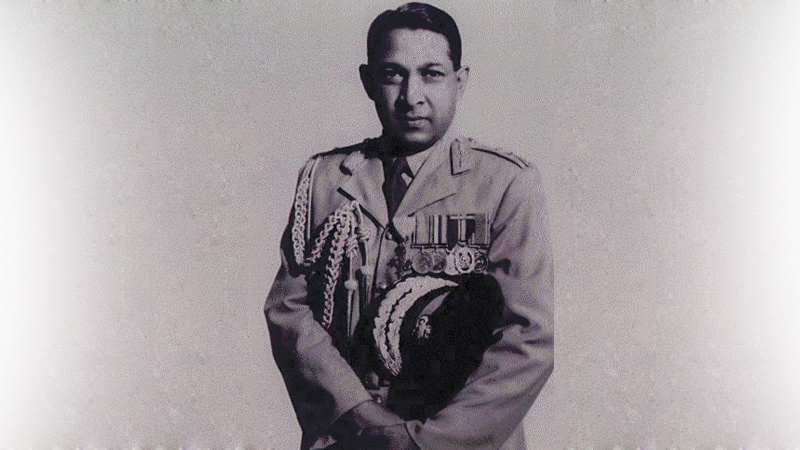This writer listened to the farewell speech of Admiral Travis Sinniah recently and was inspired into penning this piece of two other commanders of distinction from the past.
The first Ceylonese-born soldier to command his country’s army became the commander of the Ceylon Army in 1955. When he announced his intention to retire in 1959, Prime Minister Solomon Bandaranaike asked him to stay on. He went on to serve as Ceylon’s High Commissioner in Pakistan and Australia, and later as Ambassador to Egypt.
After a further spell at University College in Colombo, he went in 1928 to Jesus College, Oxford, to read PPE. After Oxford, Muttukumaru read for the Bar and was called by Gray’s Inn, before returning to Ceylon to take his oaths as an advocate of the Supreme Court. He meanwhile joined the Ceylon Defence Force as a volunteer and in 1934 was commissioned in the Ceylon Light Infantry.
Muttukumaru’s last official duty as army chief was to supervise the funeral arrangements for the assassinated Bandaranaike. In 1960 he went to Karachi as Head of Mission in Pakistan (with concurrent responsibility for Afghanistan, Iran and Iraq). In his subsequent posting as High Commissioner to Australia and New Zealand (1963-1966) he composed the melody Ode to Anzac, which was played at the parade held at Canberra on the 50th anniversary of the ANZAC landings at Gallipoli in 1915.
In 1966, Muttukumaru became Ambassador to Egypt, where he witnessed the Six Day War with Israel. He was concurrently Ambassador to Jordan, the Sudan and Tito’s Yugoslavia. He wrote A Military History of Ceylon and an autobiography, Wig, Sword and Parchment. He was also a great collector of walking sticks, amassing some 300 during the course of his life.
Rajan Kadirgamar
Rear Admiral Rajanathan “Rajan” Kadirgamar, was the second Ceylonese Captain of the Royal Ceylon Navy from 1960 to 1970 and as such the longest serving Commander of the Navy.
He had three brothers. His older brother S.J.C. Kadirgamar Jr., QC was an eminent lawyer in commercial law, his youngest brother was Lakshman Kadirgamar, PC former Minister of Foreign Affairs, and his third brother was Selvanathan “Bai” Kadirgamar was a major in the Ceylon Army. Kadirgamar was educated at Royal College, Colombo.
With the outbreak of World War II, Kadirgamar joined the Ceylon Naval Volunteer Force as a cadet officer. After completing his officer training he graduated, winning the Sword of Honour at the passing out parade at Trincomalee, in 1941.
In 1964 his appointment was confirmed and he served as Captain of the Navy until his retirement in 1970 with the rank of Rear Admiral. He established the Naval and Maritime Academy in Trincomalee. Kadirgamar was appointed a Member of the Royal Victorian Order (MVO) for service to HM Queen Elizabeth II and had been awarded the 1939-1945 Star, the Burma Star for war service from 1939–1945. For service in the Royal Ceylon Navy he received the service medals Ceylon Armed Services Long Service Medal, Ceylon Armed Services Inauguration Medal and the Queen Elizabeth II Coronation Medal. He had also served as extra aide-de-camp to three Governor-Generals.
National security
Admiral Sinniah spoke movingly about the “Men in White”. His words were around the navy and what it stood for in the context of national security. As this piece is being written Parliament has been debating the pros and cons of a new constitution. The arguments are primarily about primacy Vs inclusivity. Primacy which excludes sections.
The examples cited of the role Tamil officers evokes the reality of scores of not only Tamils but Burghers, Malays, Moors, Borahs, Parsis and others who have served, continue to serve and will serve the national as honourable, men and women with dignity and self respect. Our history is replete with contributions of all segments of our society.
Tamils are no less Sri Lankan than anyone else. In a land which believes in rebirth can it said that in cycles of birth the soul would always be born a human being and of only one religious denomination?
With utmost respect I say those who doubt fellow Sri Lankans and wish to keep a segment of our society in different halves are secessionists. Mercifully we have history to show that this country survived and prospered due to the acts of many and not of only a select few.



There are 2 Comments
Service
Honourable Service
Add new comment